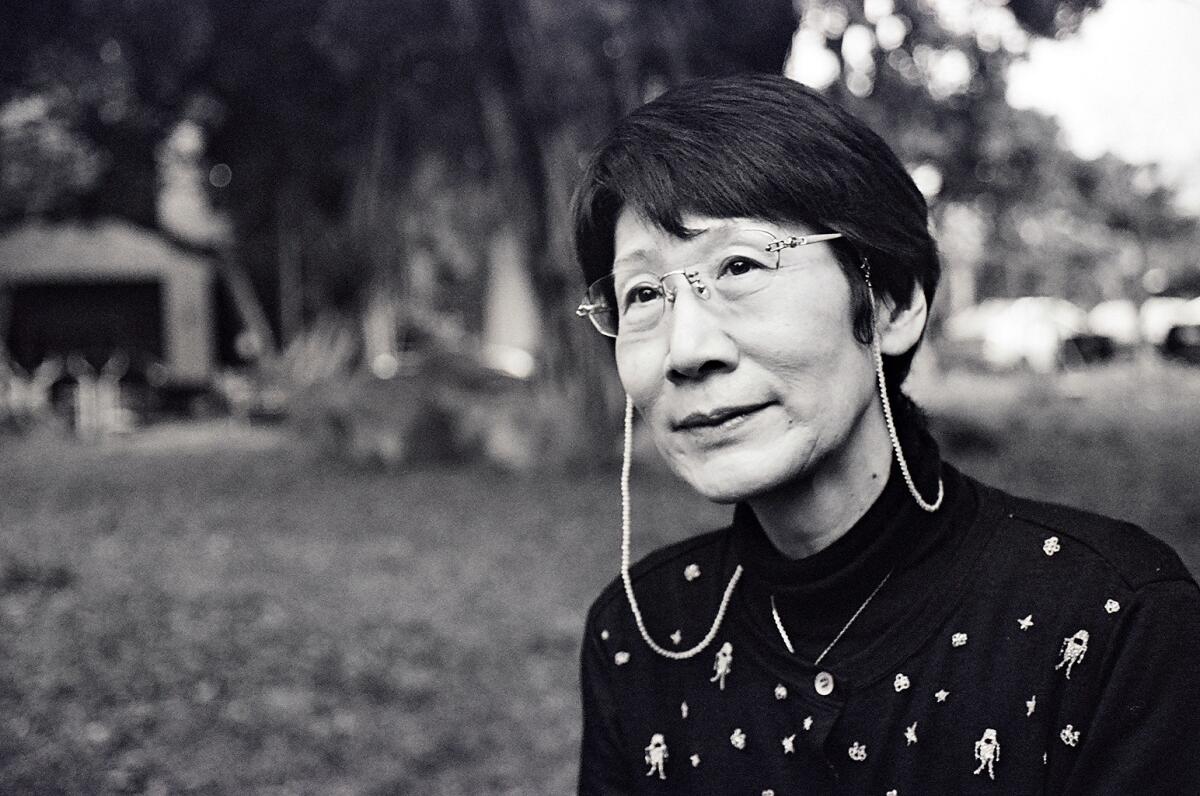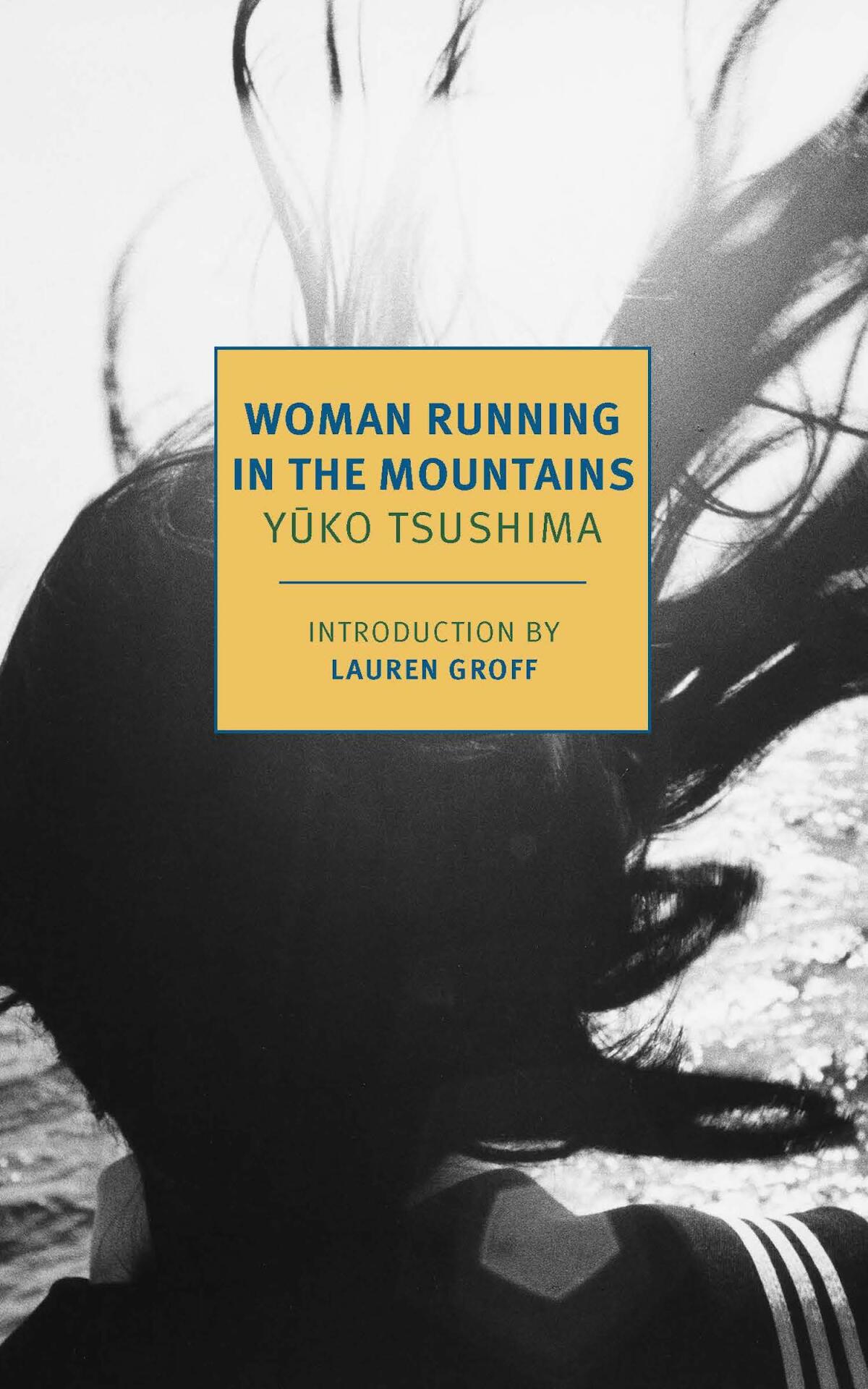Review: What a 1980 Japanese novel about a single mom foresaw about pandemic loneliness

- Share via
On the Shelf
'Woman Running in the Mountains'
By Yūko Tsushima
Translated by Geraldine Harcourt
NYRB Classics: 288 pages, $18
If you buy books linked on our site, The Times may earn a commission from Bookshop.org, whose fees support independent bookstores.
Yūko Tsushima’s 1980 novel, “Woman Running in the Mountains,” has been called many things. Narrated by a single mother in early parenthood — as Tsushima was and as her mother had been — it was considered a typical “I-novel,” a confessional book narrated in the first person, not unlike what we would call autofiction here in the States.
Translated into English by Geraldine Harcourt and now released as an NYRB Classic, the book has also been called a feminist novel, as it follows the trials of Takiko, who chooses to have her baby while unmarried, ignoring the pressure to abort, and who is desperate to escape a home where she suffers horrific emotional and physical abuse at the hands of her father.
Yet Tsushima did not consider herself a feminist but rather a humanist. As for the “I-novel,” she said: “I write fiction, but I experience the fiction I write.” “Woman Running in the Mountains” captures not only Takiko’s struggle but the unbearable loneliness of being a single parent of any gender.
What makes this rerelease feel so urgent? Forty years have removed some of the stigma from single parenthood but little of the difficulty. In the U.S., 80% of single parents are women. A popular refrain of the partnered is “I don’t know how single parents do this.” Now add a pandemic and a country in a child care crisis.
The stay-at-home order of the early pandemic gave some a chance to rest, to read a book or to take up a new exercise routine. For parents of young children, however, the last two years have been a time of unceasing struggle to balance professional and domestic labor.
By eradicating choices, COVID-19 has in some ways made single parents of us all. “There was nothing else she could do: this was the conclusion she inevitably reached,” Takiko thinks. “She had given birth to a baby that no one wanted her to have, a birth to which she alone had consented. Regrets were not permitted.” Any parent of an unvaccinated toddler will feel a twinge of understanding.
In a noisy 2020, it was too easy to overlook these 10 literary gems, from Miranda Popkey’s “Topics of Conversation” to Mieko Kawakami’s “Breasts and Eggs.”
Takiko never considers ending the pregnancy, and though her mother pleads with her to stay home to care for the baby — “Who’d want to hire someone like you?” she asks — Takiko is determined to live independently. It’s more than wanting a career or a social life. It’s a commitment to herself that persists despite societal aggression trying to tear it down: the stigma of “illegitimate” pregnancy and single motherhood, abusive parents, the very real threat of poverty.
“As long as she, at least, could live that would be enough,” she thinks. “She couldn’t let anything happen to her because of this, not when it had turned out to be such a simple thing.” But the pressure from home makes her consider throwing in the towel. “I can’t see myself ever being able to give up everything,” she tells her lover, Kawano. “But that’s what [the baby] is telling me to do — give up, give up.” Takiko’s resilience has the reader wondering why parents should have to sacrifice so much, indeed, for “such a simple thing.”

Takiko is certain she will be able to go on as she was before her pregnancy, to live her life and set goals for herself as a parent. Her mystical confidence is what gives the novel its unique strength. Despite the stigma, Takiko refuses to let her responsibilities as a mother overwhelm her identity as a human being.
Tsushima expresses Takiko’s confidence through her appreciation of nature — to borrow from Virginia Woolf, her “moments of being.” Outside the maternity ward, in which “hundreds, no thousands, maybe even tens of thousands of women had lain here staring up at the same ceiling,” she delights in the poplar tree outside. “The view bordered by the square window frame gave a deceptive impression of nearness, like a mirage. In the evening the tree would bask in the setting sun, reaching the height of its brilliance.”
Eventually Takiko finds work at a plant nursery she’s admired through its gates. There she meets Kambayashi, a man who tells her he has a 10-year-old son with Down syndrome. The two are able to speak frankly about how “you can’t just get away from a child,” and Takiko is surprised at their camaraderie. “She had been assuming that every child who didn’t have to be called illegitimate must be blessed with a father and mother and perfect health.”
Kaoru Takamura’s books made her an acclaimed bestseller in Japan for decades. How one American editor finally translated her epic, “Lady Joker”
When she discovers Kambayashi is taking a trip to “the mountain” to gather plants and seedlings for the garden, she begs to go along, leaving her son in her mother’s care for the first time. There, she meets another parent, a woman whose daughter is adopted. Learning about the experience of other parents is revelatory. She yearns for a deeper connection with Kambayashi, a physical one. “What was rapidly rising in her own body, she felt, was that excess of green.”
Tsushima’s work is grounded in her social consciousness, making “Woman Running in the Mountains” both a timely and a timeless read: Parents are inherently isolated, pandemic or not. What we believe to be our loneliness is perhaps only a matter of it being unspoken. While nearly making love with Kambayashi, Takiko wishes her body “would split apart, split in two and melt irretrievably into the rain and earth.” How often as parents have we felt this same wish for division, for two different lives?
Division but also union. Here is something else COVID has taken from us: commiseration. What is not easy to say has recently been physically impossible to share — even if it is only a knowing glance, a raised eyebrow, a supportive laugh at the playground.
Upon her return from the maternity ward, Takiko dreams of her mother, a lonely girl atop a mountain wearing a glittering amethyst necklace, watching others sled down the snowy slope. “This was how her mother had ended up, she thought: the wife of a man from a small town, a stranger to both the glitter of the ice and the rolling green. Maybe her mother had settled for what she’d got, but Takiko didn’t want to give up. She couldn’t do it.”
Takiko names her son Akira. “There were many different characters that could be used to write this popular boy’s name, but the one she’d decided on was ‘crystal,’ part of the word ‘quartz.’” When Takiko begins contractions, she feels lucky that it’s early enough that she can slip out of the house unnoticed. On her way to the hospital, she imagines “holding a baby lightly to her breast and running at top speed.” Akira is not so much an obstacle, then, as he is a diamond in the rough, a permanent part of Takiko and her adamantine resolve to live on her own terms.
Ferri’s most recent book is “Silent Cities New York: Hidden Histories of the Region’s Cemeteries.”
Kate Zambreno’s process is rumination and frenzy. That’s how she completed “To Write as if Already Dead,” an homage to the late writer Hervé Guibert.
More to Read
Sign up for our Book Club newsletter
Get the latest news, events and more from the Los Angeles Times Book Club, and help us get L.A. reading and talking.
You may occasionally receive promotional content from the Los Angeles Times.






